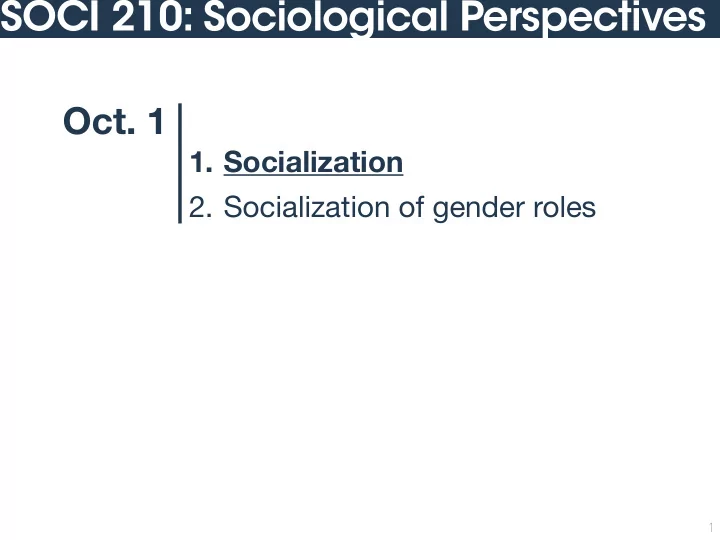

SOCI 210: Sociological Perspectives Oct. 1 1. Socialization 2. Socialization of gender roles 1
Theories of Socialization 2
Socialization is … Learning Internalizing Developing culture norms self ⦙ Non-material culture ⦙ Unspoken and ⦙ Negotiating one’s (beliefs, practices, explicit rules of place in society roles, behavior) behavior (roles, relationships, appropriate behavior) ⦙ Material culture ⦙ Roles and (significance and use responsibilities ⦙ Constructing identity of tools, structures, become “natural” in relation to society objects) 3
Theories of socialization Childhood development ⦙ The bulk of socialization occurs while one is “growing up” ⦙ Theories of socialization tend to focus on birth through teenage years Psychological theories ⦙ Focus on developmental phases of relations, emotions, etc. (Freud, Erikson, Kohlberg, …) Sociological theories ⦙ Focus on social expectations and roles (Cooley, Mead, …) ⦙ Looking-glass self (Cooley) ⦙ Roles as relations Symbolic interactionism ⦙ Focus on roles, situated sense of self, and the generalized other ⦙ Tightly linked to theories of childhood development 4
Socialization of perception Socialization shapes our fundamental experience of the world around us Cognition Judgement Communication ⦙ Spatial ⦙ Fairness ⦙ Language understanding ⦙ Disgust ⦙ Body language ⦙ Color categories ⦙ Beauty ⦙ Facial expressions ⦙ Numerical reasoning ⦙ Musical harmony 5
Socialization of roles Roles shape expectations ⦙ Often it is not a question of general behavior. “What is the right/wrong way to behave?” ⦙ Instead, a question of role-specific behavior. “What is the right/wrong way for people like me to behave?” ⦙ Moreover, role-specific behavior is sensitive to situational context. “What is the right/wrong way for people like me to behave toward people like you ?” Reflexivity ⦙ Behavior is prescribed by situated roles Roles Behavior ⦙ Roles are defined by characteristic behavior 6
Recommend
More recommend